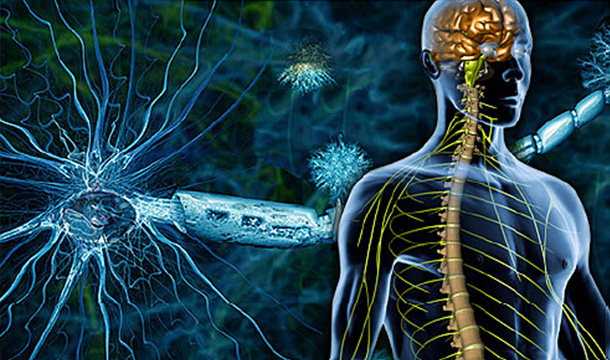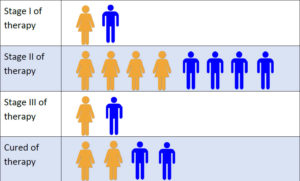
Multiple Sclerosis (MS)
MS is a disabling and unpredictable neurological disease. It affects more than 2 million people & it has no cure.
Dr.Raghavan is an Ayurvedic physician with the Vaidyaratnam (jewel among physicians) title. He is also a modern medicine doctor from India. He has been practicing as an Ayurvedic physician for almost five decades. His work focuses on chronic and critical disorders without established cure in any system of medicine. He is the founder owner of Dathathreya Health Institutions, which has offices in Kerala, India and Podgorica, Montenegro.
We use classical Ayurveda knowledge and guidance of Dathathreya heritage (3500 year-old traditional Ayurveda School) to treat MS patients. We have no medicine for MS disease. We treat each MS patient differently, as per the requirements of his/her health.

We use the Ayurvedic pulse examination tool of Dathathreya heritage for precise diagnosis and predictable prognosis. This pulse examination technique reveals information about patient’s health, pathogenesis, disease development and clinical manifestations. It also helps us to decide the type of therapy, duration of therapy, prognosis on the arrest of MS exacerbation and restoration of lost functions, and prediction of recovery on a chronological basis. We also use clinical evaluation like blood tests, neurological examination or clinical examination by neurologist, Magnetic Resonance Imaging (MRI), Magnetic Response Spectroscopy (MRS), Magnetic Transfer Imaging (MTI), Diffusion Tensor Imaging (DTI), Functional MRI (fMRI), Evoked potential tests, Lumbar puncture (Spinal tap), others.

Dathathreya ayurvedic therapy for MS is totally patient-specific. We rely on Dathathreya pulse examination tool to plan therapy and to monitor the health conditions of patients during the course of treatment.
The therapies may include oral Ayurvedic medication, Ayurveda procedures (e.g. oil dhara, Shirovasti etc.) and specific physiotherapy based on techniques preserved by Dathathreya heritage. The nature of therapy will vary based on the type of MS (RRMS, PPMS, SPMS or PRMS), state of disease (mild, moderate or severe), and based on patient’s unique physiological and psychological requirements. Some patients will be prescribed oral medication, some may have oral medication and home-based therapies, and some may need oral medication and in-patient therapy.
Dathathreya therapy for MS is a multi-stage process:
Stage 1: Arrest relapse of MS symptoms
Stage 2: Disappearance of MS symptoms, complete remyelination & disappearance of sclerotic area
Stage 3: Observation and maintenance of the restored health
The yardstick of prognosis is all-round health improvement expressed in better digestive and assimilative process, improved body strength and complexion (Agni, Bala, Varna vartanam).

The total duration of treatment is seven years. The effects of first stage of therapy will be experienced in a very short duration of less than one month. The effects of therapy for stage-II will be experienced by different patients differently. It can be between 30 days to 600 days. Once this stage is achieved, the patient has to continue therapy during the entire observation period of seven years, or until the doctor is clinically convinced that he/she is completely cured.
We cannot exactly predict how long it will take to cure you. This is because your recovery will depend on so many factors not within our control (examples are family conditions, patient’s attitude to life and therapy, environmental factors, karma etc). If patients discontinue therapy against medical advice (which may happen and maybe justifiable as the therapy duration is long), it becomes very difficult for us to assure results within any time-frame.

There is no single pattern in disease progress and disease course. Some persons with MS will have a mild course of MS with little to no disability, while some others will have steadily worsening disease that leads to increased disability over time. Similarly, whatever be the disease course i.e. relapsing-remitting MS (RRMS), primary-progressive MS (PPMS), secondary-progressive MS (SPMS), and progressive-relapsing MS, the changes are unpredictable.
The number and position of lesions on a patient’s central nervous system does not necessarily correlate with their relapse occurrence or level of disability. This means that there can be patients with several brain lesions but completely asymptomatic and vice versa.
Some patients with MS will have short periods of symptoms followed by long stretches of relative relief, with partial or full recovery. The presence of symptoms is called an attack, or in medical terms – exacerbation. Recovery from symptoms is referred to as remission, while a return of symptoms is called a relapse. In modern medicine treatment the patient will have temporary improvement of symptom, but never have complete remission. In Dathathreya Ayurveda therapy, one of our main goals is to bring permanent and complete remission. But, even in our therapy we have observed that patients who have clinically progressed to stage II may experience an exacerbation. But they will make a full recovery if they follow the instructions systematically. So, sometimes lines blur between the three stages.

| Dathathreya therapy for MS | Modern medicine treatment for MS |
| EFFICACY | |
| • Evidence of cure available • Efficacy visible on disease pattern • Efficacy visible on disease progress |
• No evidence of cure • Efficacy in disease progression is virtually absent • Efficacy visible in preventing relapses and managing symptoms |
| SAFETY | |
| • No side-effects • Protects the immune system & • Equips the body to fight the disease |
• Modern immunosuppressant and immune modulating treatments have huge toxicity • MS experts have clearly concluded that higher the efficacy, higher the toxicity |
As on May 2016, we have 16 patients (8 females and 8 males) in our therapies. Evidences of some patients are:
